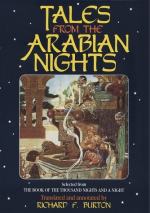morale that at times we descry through the voluptuous
and libertine picture “vistas of a transcendental
morality—the morality of Socrates in Plato.”
In no other work of the same nature is Eastern life
so vividly portrayed. We see the Arab Knight,
his prowess and his passion for adventure, his love
and his revenge, the craft of his wives, and the hypocrisy
of his priests, as plainly as if we had lived among
them. Gilded palaces, charming women, lovely
gardens, caves full of jewels, and exquisite repasts,
captivate the senses and give variety to the panorama
which is passing before our eyes. Yet we repeat
that, though there is much in the excellent version
now begun which is very plain speaking, there is nothing
intentionally demoralising. Evidently, however
the translator is prepared to hear this charge brought
against his labour of love. Indeed, there is a
tinge of melancholy pervading the preface in which
the Editor refers to his “unsuccessful professional
life,” and to the knowledge of which his country
has cared so little to avail itself. * * * * * Even
in the recent Egyptian troubles—which are
referred to somewhat bitterly— his wisdom
was not utilised, though, after the death of Major
Morice, there was not an English official in the camps
before Suakin capable of speaking Arabic. On
this scandal, and on the ignorance of Oriental customs
which was everywhere displayed, Captain Burton is deservedly
severe. The issue of the ten volumes now in the
press, accompanied by notes so full of learning as
those with which they are illuminated, will surely
give the nation an opportunity for wiping away the
reproach of that neglect which Captain Burton seems
to feel more keenly than he cares to express.
This was a sop to the friend and a sore blow dealt
to the enemy. Moreover it was speedily followed
up by another as swashing and trenchant in the Morning
Advertiser (September 15, ’85), of which long
extracts are presently quoted. The journal was
ever friendly to me during the long reign of Mr. James
Grant, and became especially so when the editorial
chair was so worthily filled by my old familiar of
Oxford days, the late Alfred Bate Richards, a man who
made the “Organ of the Licensed Victuallers”
a power in the state and was warmly thanked for his
good services by that model conservative, Lord Beaconsfield.
A phrase in the Standard, the “most archaic
of the passages,” acted upon
The “Pall
Mall Gazette”
like a red rag upon a rageous bull. I should
rather say that it excited the so-called “Sexual
I Journal” by suggesting another opportunity
for its unclean sensationalism: perhaps also
the staff hoped to provide company and a fellow-sufferer
for their editor, who was then in durance vile, his
of fences being “inciting to an indecent assault”
and an act of criminal immorality. I should not
have felt called upon to remind my readers of a scandal
half forgotten in England, while still held in lively
remembrance by the jealous European world, had not
the persistent fabrications, calumnies, and slanders
of the Pall Mall, which continue to this day, compelled
me to move in self-defence, and to explain the mean
under lying motives.




